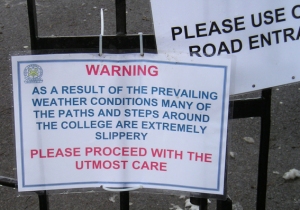Richard Weston, aka design blogger AceJet170, has been in touch about something that, he says, ‘makes [his] head hurt’.
As well it might. Richard had spotted this online:

If you can’t read that line top right, it says, Untap Your True Potential. This was the bit that gave Richard pause.
He’s also spotted this:

Hmmm.
Random capitals aside, something weird is happening here. It’s one of those peculiar misunderstandings that leads people to say things that are the exact opposite of what they mean.
The problem may result from a confusion with phrases like, ‘Unleash your potential’.
Trouble is, ‘Un-‘ is a negative prefix. It means you’re doing the opposite of the verb concerned. Unleash means not to leash – a linguistic point of particular importance to dog handlers.
What the lines above mean, of course, is ‘tap your true potential’.
That sounds rather ugly, though. You’d probably say, ‘Realise your true potential’ or, indeed, ‘Unleash your true potential.’
‘Untap your true potential’ is not only the opposite of the intended meaning, it’s also pretty meaningless. You can’t ‘un–‘ something, unless it’s something already done. (Like ‘Untying the furious copywriter’.)
So you could only ‘untap your potential’ after having tapped it. Which wouldn’t make much sense.
Sadly, a Google of this phrase shows how rife it is. There’s even a Facebook group:

This is nothing new
Of course, there are other, accepted phrases that mean the opposite of what’s intended.
Famously, for example, our American cousins say, ‘I could care less’, when what they really mean is they couldn’t care less.
We also say that a man who’s quick to anger has a temper. But if he gives vent to that anger, he loses his temper.
That doesn’t make much sense. You don’t get angry by losing your anger.
Temper, it turns out, has a pretty interesting and complex history. But this isn’t an etymology blog, so if you’re interested, have a look at Wiktionary and this blog post. You start to see how this confusion might have come about.
The point is, we’ve ended up with phrases we all understand, but which contradict each other completely. Purely through usage.
This suggests that a nonsensical construction like Untap your true potential could quite easily become part of the language, simply because enough people use it incorrectly for it to come to mean the complete opposite of what it says.
Now my head’s hurting, along with Richard’s. And yours, probably.
……………………………………………………………………………………………………………………………………………………
PS: If you have any other examples of phrases that mean the opposite of what they say, do let me know. Thanks.
51.232910
-0.329744
Filed under: Confusing, Contributions, Downright ugly, Grammar









You’re telling me